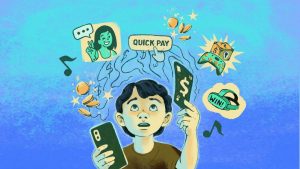
Over the past decade, social media personalities have taken the world by storm, influencing the products our children are interested in, how they behave, what they want to be when they grow up, and more. These influencers are exposing children to subtle and overt advertisements and new social trends, and while this type of parasocial relationship is not new – we have seen it in the past with actors and other celebrities – influencers’ feigned authenticity makes their impact even more powerful.
How can you, as parents, mitigate the negative effects of kidfluencers and social media influencers as well as encourage healthy relationships on and offline? Do your kids want to become influencers themselves? We asked an interdisciplinary panel of distinguished experts to weigh in on the motivations and implications of the kidfluencer and influencer age, as well as how you can help your children thoughtfully and carefully navigate the world of young social media stars. Read their advice below, and click HERE to watch Children and Screens’ recent webinar on this popular subject.
Q1. What Happens If My Child Wants To Become An Influencer?
Many parents think that their kids want to be influencers, but first ask yourself, “Who really wants to be the influencer?”
“Recent research in Europe suggests that almost all kidfluencer profiles were actually managed by the parents, so even though the profile looks like it’s managed by the child, usually the child has no direct access to the profile.”
This suggests that when a child decides that they want to be an influencer, it may be caused by subtle pressure or encouragement from their parents, who may be projecting their own dreams of popularity onto their children.
It All Starts With You
If a child wants to become an influencer, Jennifer Miller, MEd, author of Confident Parents, Confident Kids, suggests that parents “talk about the power and responsibility that it entails, what important boundaries and rules you need to respect as a family, and in which ways your child can contribute.” Miller relays the story of her son, who asked if he could produce unboxing videos, but Miller “set the boundary that he could produce videos that either ‘teach something,’ ‘tell an original story,’ or ‘help someone,’ and offered him examples in his interest areas. Four years later, he publishes videos on YouTube on ways in which he customizes model trains with his own creativity and has learned extensively about how to manage social media in healthy, constructive ways.”
Think Before You Share
Be careful when sharing pictures or videos of your children on social media, especially when you have a large reach on those accounts. “Parents don’t have control over the spreading of these images and videos,” Hudders says. “In the long run, sharing online information of your child contributes to the construction of your child’s digital identity, depriving them of the ability to build their own identity.”
Q2. What If It IS My Kid Who Wants To Be An Influencer?
“Anybody who has a kid influencer should start with therapy right away – not because you are sick, but because it is an inherently challenging situation,” says Pamela Rutledge, PhD, Director of the Media Psychology Research Center and faculty at Fielding Graduate University. “People equate child fame with the same symptomatology as addiction – first you love it and then you hate it, and then you find out that you can’t live without it. Sometimes trying to keep that level of fame causes you to do things that you wouldn’t otherwise, and it ends with a lot of mental health issues. So while there is a lot of upside to being an influencer, it’s a double edged sword, and only a small portion make enough money to pay the bills.”
Q3: How Do These “Influencers” Actually Impact Children’s Choices?
Influencers target children with messages that can be explained through the intersection of three processes, explains Kelli S. Burns, Ph.D., Associate Professor at the University of South Florida. “First, children who are scrolling on social media sites are often actively processing information, which is a different experience than one has while watching television commercials.” Second, influencer content is often indistinguishable from content from regular users. And finally, influencers who are relatable and appealing to children become trusted sources of information.” The combination of active processing, the lack of distinctiveness of influencer content, and the source credibility of many influencers leads to a situation where influencers can drive the choices of children.
Q4. How Do I Know If My Child Is Being Impacted By Influencers?
Note any changes to their behavior, like new diets, and join the same social media platforms. “You don’t necessarily have to follow your children, but it helps you to understand what is circulating on those platforms,” Burns adds. “For example, TikTok has promulgated such harmful challenges as “#deviouslicks” where young people post videos of items they are stealing from schools.”
Q5. Is Watching Influencers Online Impacting My Kids’ Social Development?
Watching influencers online can strongly contribute to a sense of scarcity or lack (“I don’t have what I need to be happy!”) and contribute to creating a consumer-centric child, Miller explains. “However, parents play a critical role in setting boundaries, teaching about social media interaction and healthy contributions, and offer balances by creating sacred off-screen time for play, reading and creativity.”
Q6: I Have Heard That Relationships Are “Parasocial.” What Does That Mean?
Parasocial relationships are one-sided relationships in which kids think influencers, celebrities, characters, or others, are their friends. In a parasocial relationship, one party (in this case, the child), puts forward emotional energy and time, whereas the other party (in this case, the influencer) does not know of the other’s (the child’s) existence. By sharing their “authentic” selves, influencers create intimacy with their audience and children are enamored with their charm, celebrity, and lifestyles. It is natural for children to seek out and emulate role models, but these sorts of parasocial relationships may have unintended consequences.
Research shows that children often imitate the behaviors they see, so it is very important for parents to model good digital behaviors and habits. “Put away phones, laptops, and tablets during family time,” says Harsha Gangadharbatla, PhD, Associate Professor at the University of Colorado Boulder. “Since the effects of parasocial relationships that children form with social media influencers can be quite strong, be sure to play an active role in the selection of your children’s videos so you influence the algorithms.”
Q7. What Can Parents Do To Mitigate These Effects?
Before you jump to too many conclusions, screen a few posts from the influencer yourself to see what the fuss is about, says Sherri Hope Culver, MLA, Director of the Center for Media and Information Literacy at Temple University. “Create a conversation with your child about the influencer. Ask questions like: ‘what’s your favorite post that this person shared?,’ and ‘if a real friend of yours acted this way, would that make you feel that they were a trustworthy friend?”
Demystify
Scientific research suggests three strategies parents can use to minimize influencers’ impact. “First, explain the purpose is to get your child to want the things mentioned in the video,” says Tim Kasser, PhD, author of The High Price Of Materialism and Hypercapitalism. “Second, model to your children that these influencers are not to be taken seriously. Research shows that when children see their parents mock and make fun of advertisements, children’s materialistic desires decrease. And third, shift the focus to values like personal creativity and compassion.”
“Parents of younger children are encouraged to limit the amount of time their child watches these very popular, seemingly harmless videos/posts on YouTube and other platforms,” says Omni Cassidy, PhD, Assistant Professor at NYU Grossman School of Medicine, writes. “Parents of older children can talk with their child about influencer videos/posts, and how companies use other children like them to sell them products.”
Be Their Influencer
Get comfortable having uncomfortable conversations, suggests parent-child psychotherapist Joanna Fortune. “Consider opening a shared social media account and follow some accounts that you can sit and look at together. Express curiosity about the message in posts, the editing in photos, and talk about what is real versus carefully curated.” By being an active part of these conversations, parents can ensure it is their voice, their message and their moral guidance that their children default to rather than other external influencers.
Q8. What Should I Watch Out For As My Child Seems To Be Interested In Getting Followers Outside Their Friend Network?
“It’s very difficult, no matter what your age, to maintain your sense of identity – i.e. what’s my online persona vs. my offline self,” explains Rutledge. “Kidfluencers are allegedly showing their fans their authentic self, and if they reveal too much of themselves online, they run the risk of letting the feedback that they get from their fans define their identity, rather than their intrinsic motivations. It’s important that parents closely monitor children who begin to have a presence on social media and help them steer towards their own authentic personalities and interests, and not just what’s getting the best engagement or response from their followers.”
Q9. Is It OK For My Child To Be On Social Media And Follow Influencers?
Following strangers—like influencers and celebrities—makes you feel bad about yourself and your own life, cautions Melissa Hunt, PhD, Associate Director of Clinical Training at University of Pennsylvania. “Studies find that some social media use can make kids feel happier and more connected to their peers.” However, Hunt adds, too much social media time is associated with significant increased risk for depression, body dissatisfaction, social anxiety and upward social comparison.
Q10. Is It OK For My Kids To Follow Their Favorite Celebrities On Social Media?
In addition to influencers, kids may be interested in following their favorite actors, sports players, or music stars on social media. While these celebrities may have the chance to be a different person on social media than they are when in their television or movie personas, their social media is still often highly curated. It’s normal and natural for children to want to keep up with the rich and the famous — just like you may have read magazines or put rockstar posters on your walls as a teen — but it is important that kids understand the “fantasy reel” nature of social media.
Q11. My Child Is Obsessed With Watching Toy Reviews Online, Should I Be Concerned?
When children watch toy reviews, the algorithm on the social media site learns that they enjoy this kind of content and serves up more reviews. “It becomes a vicious cycle that is hard to escape,” Burns explains. “The problem with these videos is that they send a strong message of consumerism. The central theme is that buying the promoted toy can bring unlimited happiness. Unfortunately, a child is only satisfied with the toy until they are bored and start looking for the next item to fill this void.” Children who watch these videos also don’t always realize that toy influencers have been given these products for free, leading to a situation where they might be wondering why their parents cannot provide the same number of toys.
It All Starts With You
Children are especially vulnerable to advertising, and that’s particularly true when ads are indistinguishable from content. “Research shows that children are more likely to nag their parents for the advertised products after watching an unboxing video than if they watch a traditional TV commercial,” explains Josh Golin, Executive Director of Fairplay. “Do your kid – and yourself – a favor and don’t let them watch unboxing videos, especially since if your child watches a couple, YouTube will be relentless in recommending more.”
Lift The Veil
“Lift the veil for children!” Miller implores. “Help them understand the job that is behind commercial influencing. Play out and imagine together the full range consequences of the life of a kid influencer in which there’s no time to be a kid. For example, there would be no playing after you come home from school. A kid influencer would get an assignment to learn about and memorize all the details about this new toy set. After dinner, a tutor might show up to get the influencer through homework and then the child might go to school exhausted the next day. You might ask your child, ‘Don’t you think the joy might be taken away from the toy if you have to do that much work with it first before playing with it?’
Q12. How Can I Raise A Child Who Uses Social Media With Discernment?
More than ever before, your children’s entertainment content is intermingled with commercial messages from influencers. “This persuasive content becomes difficult to recognize and the consumer does not realize he/she is being persuaded by advertising,” says Beatriz Feijoo, PhD, Associate Professor of Advertising and Marketing at the School of Business and Communication, International University of La Rioja (Spain). “Under these circumstances in which nothing is what it seems, children’s advertising literacy could be based on skeptical and questioning attitudes towards what they have in front of them.”
Learn The Signs
For example, “influencers use tags like #sponsored, #ad or #paid, in order to indicate when a post is sponsored,” explains Eva A. van Reijmersdal PhD., Associate Professor at the University of Amsterdam. “If you see this, it means that a company paid the influencer to promote a product or service,” adds Esther Rozendaal, PhD, Associate Professor at Erasmus University Rotterdam. “In this way, companies hope that you will like the brand and want to buy the product or service.” Help your kids understand that when they see these tags, the influencer may not be sharing their authentic opinion, but rather they are trying to sell a product.
Teach Kids To Be Critical
Much of this influencer advertising promotes unhealthy foods and beverages in their videos, and fail to mention any downsides to (over) consuming unhealthy foods. “In the absence of effective regulation of this activity, and given that we know exposure to this content increases children’s snacking, it is hugely important for parents to encourage children to think about the motives of the influencers,” notes Emma Boyland, PhD., Senior Lecturer at the University of Liverpool. “Also, remember that influencers will not necessarily have their viewers’ health or best interests at heart.”


